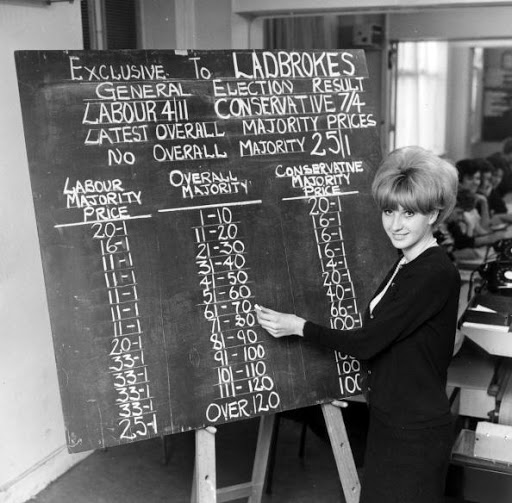Punter Psychology. Finding the perfect balance of arrogance and humility

Picture: 1964 general election odds.
There shouldn’t be any value bets, in theory. Every bet we place isn’t just a forecast about an election or other event. We are also making a statement; that the forecast made by the collective wisdom of every previous punter is wrong and that we have noticed before other smart gamblers can put the price right.
In principle, every value bet is an opportunity someone else should already have taken. In practice, the market clearly can be beaten as many people on this website can attest. But the question remains, every time you see a bet you like: How do you justify the arrogance of thinking you know better than the market, while avoiding the opposite trap of missing out because you give the market too much respect?
I’ll say up front I don’t have the answer, though I will share how I try to resolve the paradox. I’d also love to hear the formula from others on this site. Here’s mine:
- Know what your edge is
While politics is my main focus, I’ll bet on anything – if I have an edge. But I won’t place a single bet where I can’t identify exactly what advantage I have which enough other punters don’t.
Sometimes this is more knowledge, such as my bets on the Lib Dem Leadership last year. As a member of the party for some years I felt I had insight into the membership’s thinking that other punters may lack.
Sometimes, this is better analysis. When betting on Biden to beat Trump I was looking at the same polls as everyone else, but was confident that casual punters were building in too much of a pro-Trump bias – their bets skewed by memories of the 2016 upset.
Whatever it is, there should be some reason you think others haven’t spotted and corrected the price error you’ve seen. Perhaps it is simply speed: When odds are first put up for an event errors simply haven’t been able to be corrected by others.
Remember: An edge doesn’t mean a secret advantage. For many years a football forecast model called The Fink Tank, presented in The Times by Daniel Finkelstein, put all its forecasts on a website available to the public. If you took those percentage chances of home wins, draws, and away wins you would turn a consistent profit on the Premier League. I did this for several seasons until the model was pulled from public view, and use a similar (also public) model for football betting to this day.
- Ideally, work out what the other punter thinks you are missing
There are two sides to every bet, and both punters obviously think they’ve made a smart choice. I always feel most confident when I think I understand what the other side is thinking, and why I see it as flawed.
The ultimate example of this is betting on the 2020 US election after election day. The betting exchanges had vast sums of money backing Trump to win overall and key states, even though the votes had already been counted. Not only was I confident of my forecast of the outcome, I was confident of why these people were still offering these bets. Donald Trump was very vocal about having actually won the election, and his supporters believed him. For obvious reasons, I felt that logic was flawed. But it’s always reassuring to have an answer to ‘What are they thinking?’, otherwise you risk being blindsided.
- Ultimately, you have to decide how much you trust yourself
There are no sure things in gambling. Even apparent guarantees, like betting on an election which has already happened, could still go wrong if there is some technicality you haven’t noticed. Platform risk is another issue, perhaps for another article.
A requirement of making money betting is to have the self-confidence to decide you are right and others are wrong. A requirement of not losing your shirt is to have the humility to recognise that the markets aren’t totally inefficient and you might be the one who is wrong. Every bet requires balancing these two things.
I find the above process helps me, and enables me to take opportunities and avoid costly errors with some confidence. But sometimes the market just doesn’t make sense, and you have nothing to go on but your judgement call.
The second favourite in the London Mayoral Election next month is Brian Rose, a political amateur with no support in the polls. I have looked for what I might be missing over and over again, considered what information or analysis I might have which others don’t, but there isn’t anything. The price is just inexplicable. This time, after a fair amount of thinking it over, I decided I was comfortable backing myself heavily. My largest ever single bet is against Rose winning the election, but despite it apparently being huge value it wasn’t the easiest I’ve ever placed.
That’s my process for deciding whether a price which looks wrong is my find or my folly. What’s yours?
Pip Moss
Pip Moss posts on Political Betting as Quincel. He has been betting on politics and other markets for over a decade. You can follow him on Twitter at @PipsFunFacts